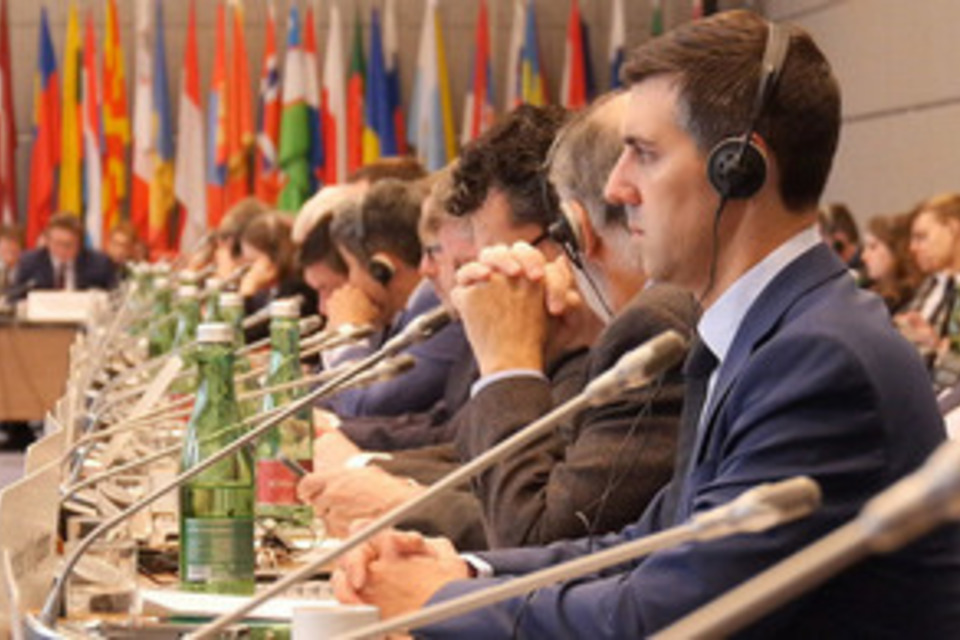Presentation by the UK Chairperson of the OSCE Security Committee, Ambassador Neil Bush
Ambassador Neil Bush briefs OSCE Permanent Council on the 2021 priorities of the Security Committee on transnational threats.

Thank you Chair.
I am grateful for the opportunity to return to brief the Permanent Council for a second year as Chair of the Security Committee.
Thank you to the Swedish Chairpersonship for putting its faith in me to continue in this role and to implement your priorities in the field of transnational threats.
I am especially eager to be working again with all participating States to advance our work in this area. Indeed, I am already grateful for the dedicated and active participation of your experts in the informal meeting of the Security Committee on 25 January – including the colleagues who so expertly facilitated discussion in the virtual breakout rooms. This greatly helped in the planning of our work.
I am pleased to start the year by building on the success at the Tirana Ministerial Council with the agreed Declaration on Strengthening Co-operation in Countering Transnational Organized Crime.
According to the World Bank, the value of transnational criminal networks engaged in various manifestations of organised crime is growing and exceeded $US 1.3 trillion by 2018—equivalent to around 1.5 percent of global GDP.
It is particularly important to break the cycle of recruitment and ensure that institutions to fight transnational organised crime continue to be fit for purpose.
The COVID-19 pandemic of course affects this threat. After some initial disruption to their operations, transnational organised crime groups are benefitting from the ongoing crisis by exploiting or exacerbating long-term or structural vulnerabilities. This makes preventing the scourge even more important.
Malicious cyber activity causes economic loss and individual suffering and poses a national security threat to our countries. The last year has forced all of us to rely even more heavily on digital technologies for nearly all aspects of our lives – this has brought the cyber skills gap and cyber security itself into much sharper focus.
The threat from terrorism and violent extremism has also sadly not diminished. Last year saw appalling terrorist attacks and loss of life in the OSCE area, including here in Vienna. The pandemic has provided another febrile atmosphere for terrorists and violent extremists to thrive, including those on the far right.
So the Security Committee work programme seeks to focus on these core areas. Transnational organised crime is a priority of the Swedish Chairpersonship-in-Office (CiO). Our meetings on this topic seek to operationalise the Tirana declaration in key strategic areas. Across all transnational threats, there is also a priority to implement existing commitments.
Our programme recognises the importance of cyber security. It also recognises your feedback that counter terrorism and violent extremism and radicalization leading to terrorism (VERLT) continue to be priority themes for many participating States and we’ve selected a framework of themes in this area to explore.
Through the timings of the meetings, I aim to maximise links and synergies with Chairperson and OSCE conferences: the OSCE wide counter-terrorism conference in April, the CiO cyber conference in May and the drugs conference in June.
Importantly, there is also a link, either directly or through the wider issues raised, between the programme and the overarching horizontal Chairperson themes for each month. And I aim to add value in the context of the work of the Committee to these monthly themes.
In the delivery of our programme, I aim for an inclusive, dynamic and de-politicised debate with more discussion and interaction with and between experts to explore the technical issues in detail.
While, like all of you, I hope for a safe return to in-person meetings soon, while the virtual format remains I aim to maximise the opportunities it offers to facilitate diverse expert participation, including in capitals.
I will seek ways through the structure of our meetings to help maximise debate and interaction, and to be as creative as possible. But, as ever, I rely on your help too to make their delivery a success.
I will continue an approach of meaningful gender mainstreaming, as well as the mainstreaming of human rights and fundamental freedoms. Gender dynamics are part the transnational threat ecosystem we face so must therefore be part of our discussions in preventing and combatting it.
And we can only effectively do that in full compliance with our human rights commitments. The voices and experience of civil society are a way to help guide us in this and I will ensure robust civil society representation in our meetings.
I will also continue to fully involve the OSCE field missions in our meetings to help bridge the gap between the work in Vienna and activity on the ground. I am hopeful we will this year meet the ambition for the Committee to visit an OSCE field mission.
I set out at the Permanent Council around this time last year my belief in the potential of the Security Committee. A year on, I have seen how this potential can be realised through our collective hard work and political will. I am excited to continue this journey and my team and I seek to be open, transparent and responsive to your feedback on how we’re doing.
Thank you.